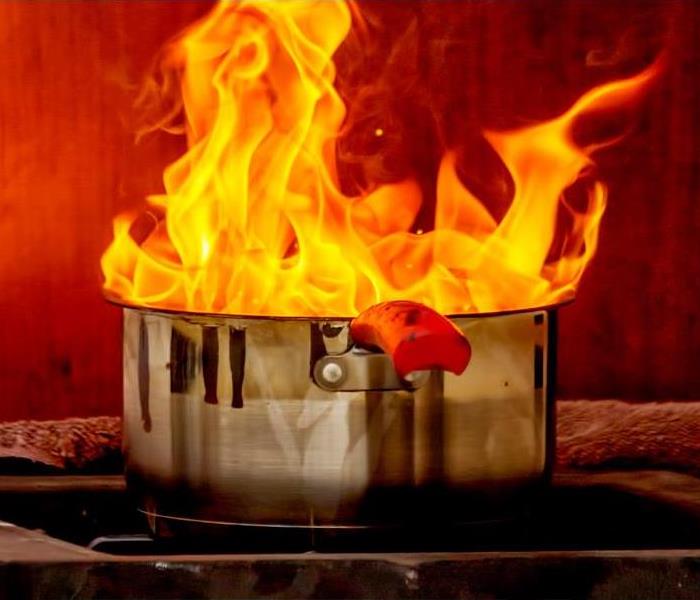Cleaning After A Grease Fire
5/28/2021 (Permalink)
There are five million kitchen fires in the United States every year, according to statistics. The majority of these are grease fires, which spread quickly and can be hard to extinguish.
Because smoke and soot from grease fires can cause considerable damage, cleaning after a grease fire is time-consuming and often challenging. Usually, the job will require the expertise of professionals.
WHAT TO DO IN THE CASE OF A GREASE FIRE
If something you're cooking catches fire, don't panic. Keep calm, and remember the following tips:
NEVER PICK UP A BURNING POT OR PAN
Trying to move a burning pot or pan can cause the fire to spread or even result in personal injury. Be sure any fire is extinguished and the pot or pan cooled before you attempt to move it.
DON'T USE WATER
Never attempt to put out a grease fire with water. Not only will water not extinguish a grease fire, but it will actually cause the fire to spread.
COVER THE PAN WITH A METAL LID
Carefully covering the burning pot or pan will deprive the fire of oxygen, causing it to extinguish.
DOUSE WITH BAKING SODA
If there is no lid handy, dumping baking soda on a grease fire will also do the trick.
USE A FIRE EXTINGUISHER
The surest way to extinguish a grease fire is to use a fire extinguisher. Every household should have an extinguisher at the ready and within reach of the kitchen.
CLEANING AFTER A GREASE FIRE
Cleaning up following a grease fire can be a daunting task. The first thing you'll want to do is to open all the windows and get a few fans running. Be sure to turn off the HVAC system, as it may carry smoke and soot to contaminate other areas of your house.
Use vinegar to clean soot and grease. In addition to being an effective cleanser, vinegar helps remove the smell of smoke.
While cleaning, be sure to check surrounding appliances for smoke, soot, and grease damage. If your microwave is mounted above the stove it will likely need to be replaced following a grease fire.
PREVENTING GREASE FIRES
The following tips can help you significantly lower your odds of experiencing a grease fire while cooking:
DON'T LEAVE THE STOVE UNATTENDED
Because grease fires can spread very quickly and prove difficult to extinguish, the sooner they're caught the better. Never leave a pot or pan on the stove unattended.
USE OIL PROPERLY
When cooking with oil, be sure to use the correct amount. Also, be sure to heat oil to temperature slowly. Never cook frozen food in oil.
KEEP STOVE AREA CLEAR
Store dishtowels, pot-holders, and anything potentially flammable away from your oven and stove burners.
HAVE A LID HANDY
Always keep a metal lid close by when cooking on a burner. Having one handy with which to suffocate a grease fire can be the difference between a small incident and a dangerous and costly event.
WHEN TO CALL IN THE PROS
Because grease fires cause such extensive damage, and because cleanup can be a long, intensive process, it's almost always advisable to call in professionals.
Experienced experts like the folks at SERVPRO of University, SE Orlando know how to clean your fire damage quickly and efficiently. They also know how to locate hidden fire damage, such as soot and smoke contamination inside heating and air-conditioning ducts.
GREASE FIRES AND YOUR HEALTH
Soot and smoke are unhealthy and prolonged exposure can lead to significant health effects. In the event of a grease fire immediately remove children and pets from your home. You'll also want to replace any filters in your home, such as those in your refrigerator and furnace. Finally, discard any food that may have been contaminated.
A grease fire can be a frightening and destructive event. Should you experience a kitchen grease fire in your home, be sure to follow the above tips to lower your risk of injury and help minimize potential damage to your property.





 24/7 Emergency Service
24/7 Emergency Service
